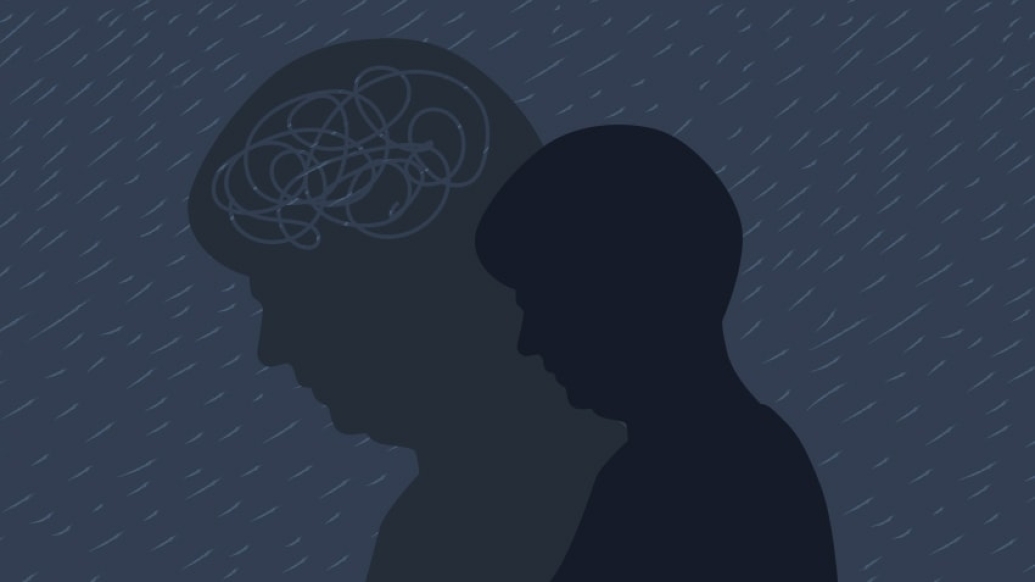A combination of medication and other therapies can help ease non-motor symptoms affecting those with Parkinson’s disease.
1:00 PM
Author |

Most people think of Parkinson's disease as marked only by tremors, muscular rigidity and slow, imprecise movements, but Parkinson's is more than a movement disorder.
Most people with Parkinson's also have quite a few non-motor symptoms, such as anxiety, depression and psychosis. Many of these symptoms may have started before the Parkinson's disease became obvious.
The effects are widespread. Several years ago, a large clinical study of more than 1,000 people with Parkinson's disease of various durations demonstrated that only 1.4 percent of the participants did not report any non-motor symptoms.
In other words, 98.6 percent of the study participants had some form of NMS. Psychiatric symptoms accounted for 60 percent, while visual hallucinations that could have signified psychosis were present in about 35 percent of patients.
That's why taking action is important. If you or a loved one has had a new diagnosis of Parkinson's disease, we recommend an immediate evaluation for depression, mood and cognitive problems. Frequent monitoring should also be done throughout the course of the disease.
Here are some of the common symptoms and treatment methods for Parkinson's patients with depression and dementia:
Identifying and treating depression
Between 17 to 50 percent of patients with Parkinson's have depression. Depression and Parkinson's have so many similar-looking symptoms that it is hard to tell the difference between them.
It's important to note, however, that depression is not a reaction to the disability. Rather, it seems to be related to the degeneration of specific neurons in Parkinson's disease itself.
Typical symptoms include:
-
Sadness
-
Pessimism
-
Decreased interest in activities
-
Slowing of movements
-
Fatigue
-
Mild to moderate depression
Major depression is accompanied with guilt and self-blame, which you don't often see in Parkinson's disease depression.
To treat depression in these cases, we would use the same treatments used to treat depression in the general population.
-
Selective serotonin reuptake inhibitors (SSRIs) such as paroxetine or sertraline
-
Serotonin/norepinephrine reuptake inhibitors (SNRIs) such as venlafaxine
-
Tricyclic antidepressants or MAO-B inhibitors are rarely used
-
Cognitive behavioral therapy: A type of psychotherapy in which the patient is given the tools to change negative patterns of thought about how they're reacting to things, coping with family members and their abilities. It is often combined with medications.
-
Vagus nerve stimulation, also known as vagal nerve stimulation: A medical treatment that involves delivering electrical impulses to the vagus nerve. It is used as an additional therapy for treatment-resistant depression and certain types of uncontrollable epilepsy. If you have deep brain stimulation leads in, this is not an option.
-
Electroconvulsive therapy, also known as electroshock therapy: A procedure done under general anesthesia in which small electric currents are passed through the brain to intentionally trigger a brief seizure. This seems to cause changes in brain chemistry that can quickly reverse symptoms of certain mental illness. It is highly effective and well tolerated in refractory depression.
Anxiety: Symptoms and treatment
About 5 to 40 percent of people with Parkinson's disease also have a clinical diagnosis of anxiety — feelings of worry, nervousness or unease that may be accompanied by compulsive behavior or panic attacks. Some of these symptoms can be worse or occur only when Sinemet is wearing off ("off times").
To treat anxiety in Parkinson's patients, we would use one or a combination of the following:
-
Cognitive behavioral therapy
-
Psychotherapy
-
Relaxation techniques
-
Adjust the carbidopa-levodopa (Sinemet) regiment to treat any anxiety that occurs during medication "off" times
-
Medications used for depression as described above usually work well for anxiety
-
Anxiolytics like lorazepam (Ativan) or diazepam (Valium) are rarely used due to effects on thinking and alertness
A need for caution
Doctors have to be careful which medications they prescribe. Some antipsychotic medications, for example, risk making Parkinson's motor symptoms worse — or, in combination with Parkinson's medications, can worsen any psychosis.
Watch Dr. Ridder's talk from the University of Michigan's 2016 Parkinson's & You Symposium. Dr. Ridder explains the non-motor (non-movement) cognitive and psychiatric problems seen in people with Parkinson's disease, focusing on frequency, symptoms and treatment options.

Explore a variety of health care news & stories by visiting the Health Lab home page for more articles.

Department of Communication at Michigan Medicine
Want top health & research news weekly? Sign up for Health Lab’s newsletters today!





